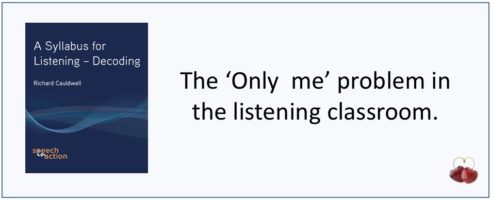42 – It’s only me
Following on from the previous post, on Fred Gordon’s talk at IATEFL 2018 (he told us how to manage feelings in the listening classroom) I thought I’d show you a section of A Syllabus for Listening – Decoding which deals with this.
The extract is from Chapter 19 Learner education and teacher-mindset. The chapter suggests ways in which you can help your students have a positive attitude to listening/decoding. Students need reassuring that:
- if they are struggling with a recording then the struggle is an opportunity for learning and
- they are not to blame if they cannot decode and understand – the sound substance is inherently difficult. Here’s the extract.
19.4.2 Deal with the ‘only me’ problem
Some learners might find it helpful if you tell them what difficulties you have as a listener, both in English and in other languages. This is to stop them getting the ‘only me’ feeling. This is the horrible feeling you get when you are experiencing a particular inadequacy in your ability to do something: you feel that ‘only you’ have this problem, and everyone else is doing just fine.
Nobody I know finds listening to their native language unproblematic. In my case I find international airports a particularly interesting place to discover the limits of what I can hear, whether it is the announcements on the public address system, the conversations of people sitting behind me in back-to-back seating, or the unfamiliarity of the accents.
To avoid the ‘only me’ feeling of inadequacy around being a learner listener, tell learners about your own problems with listening to your own language, and your difficulties when listening to other languages, then invite them to discuss their problems with listening. (If you are a teacher whose first language is not English, you are probably better equipped to do this than a native-listener teacher.) Explain the ‘only me’ phenomenon to your students and then, during listening tasks, ask them at regular intervals ‘Who is finding this difficult?’ As they put their hands up, say to them, smilingly and confidently (and jokingly): ‘Only me!’ or (more seriously) ‘See, you are not alone!’



Leave a Reply